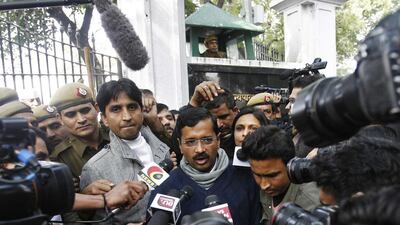NEW DELHI // The year-old Aam Aadmi Party (AAP) will form the next government of Delhi, its leader announced on Monday, capping a meteoric rise practically unprecedented in independent India.
The party founded by the anti-corruption activist Arvind Kejriwal won 28 of the Delhi legislature’s 70 seats in elections earlier this month – three fewer than the Bharatiya Janata Party (BJP) but 20 more than the Congress party, which ruled Delhi for the past 15 years.
Aam Aadmi will form the government with support from Congress to give it a majority in the assembly, after both parties declined to support the BJP.
The Congress will not be part of the new government, but will provide support from the outside.
Having campaigned on a platform that was strongly critical of both Congress and the BJP, Mr Kejriwal held an informal referendum, including 280 public meetings across the city, to ask supporters if Aam Aadmi should accept the Congress offer.
“We got responses from the citizens through the website, phone calls, SMS and by holding public meetings, and most of them favoured government formation,” Mr Kejriwal said.
The new government will be sworn in later this week, with Mr Kejriwal as chief minister. He has yet to announce a cabinet.
Aam Aadmi’s success “has been most spectacular”, said Chintamani Mahapatra, a professor of political science at New Delhi’s Jawaharlal Nehru University.
The Aam Aadmi Party – whose name in English translates as “Party of the Common Man” – rose out of the ashes of Mr Kejriwal’s anti-corruption campaigns in 2010 and 2011. Massive crowds flocked to protests he helped to organise, but he and his allies could not push the government into passing a strong anti-corruption law.
When he realised that his activism had reached its limits, Mr Kejriwal decided to enter politics. “It was the last resort,” he told The National earlier this year.
Part of the reason Aam Aadmi’s success has been so astonishing is Mr Kejriwal’s decision to depend on first-time candidates and party workers, people with no experience in campaigning or politics.
“In Delhi, people thought that Aam Aadmi would win maybe three or four seats at the most,” Mr Mahapatra said. “But the results show how unpredictable elections are in a country like India.”
There have been other debutant parties that have performed well in state elections.
In 1983, in the state of Andhra Pradesh, the Telugu Desam Party, formed only the previous year by the film star N T Rama Rao, won 202 of 294 seats in the state assembly. In Assam in 1985, the Asom Gana Parishad was created just two months before the election, yet it won 63 out of 126 seats and formed the government.
On closer analysis, however, neither achievement is quite as remarkable as Aam Aadmi’s.
Mr Rao had already, through his movies, secured a strong public following, and it was partly on the strength of his matinee-idol charisma that his party did so well. In addition, Mr Rao’s party pushed the idea of regional pride – which worked well in Andhra Pradesh but was not relevant across the rest of the country.
The Asom Gana Parishad, on the other hand, arose out of six years of agitation by student bodies who were complaining against illegal immigrants streaming into Assam from neighbouring Bangladesh. Again, the party’s foremost goal was a local issue, rather than one that could appeal to Indians elsewhere.
By comparison, Mr Kejriwal, a former tax officer was an entirely unknown quantity to the public even in late 2010, when he began his anti-corruption demonstrations. And Aam Aadmi did not have a large grassroots network to draw upon when it was launched in November last year.
Aam Aadmi has also distinguished itself from other parties – whether established or new – by refusing to appeal to loyalties of caste, religion or class. Instead, Mr Kejriwal and his colleagues constantly emphasised the need for clean, just governance and the fight against inflation and corruption.
“Their message has been very inspiring,” Mr Mahapatra said. “Hopefully it indicates the beginning of a new kind of politics.”
ssubramanian@thenational.ae

